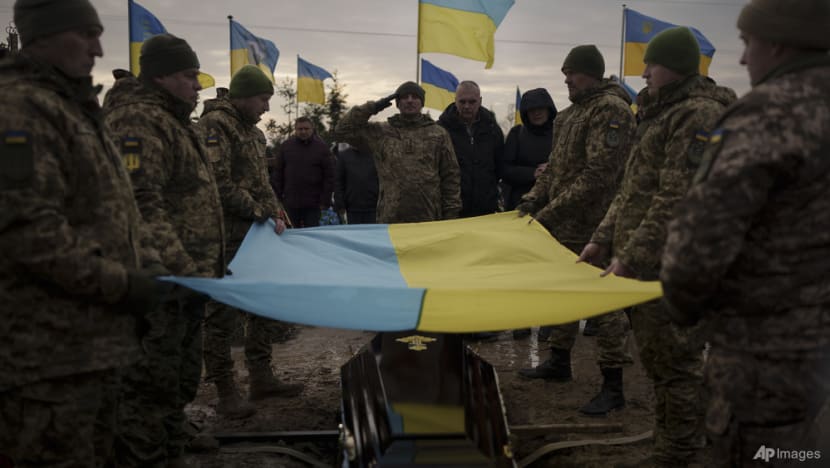‘A living hell for many’: War between Russia, Ukraine not a distant one, says Ukrainian Ambassador
“Ukraine is a country that wants to stop this war as soon as possible, as it is on our soil,” said the nation’s Ambassador to Singapore.

SINGAPORE: The drawn-out war between Russia and Ukraine is not a distant one and requires a global response for it to end, said Ukraine’s Ambassador to Singapore Kateryna Zelenko on Friday (Feb 24).
“It is always important to understand that this is not a distant war. We live in a globalised world,” she stressed.
“If we look at the magnitude of this international armed conflict, we realise that a global response is required to bring peace closer and to stop the war.”
Feb 24 marks one year since Russia launched its invasion of Ukraine.
RESILIENCE IN THE FACE OF WAR
Since then, it has been a challenging year for the country, which has lost half of its critical infrastructure and seen thousands of civilians killed, Ms Zelenko told CNA’s Asia First.
“It is quite a living hell for many Ukrainians. At the same time, the country has shown unprecedented resilience,” she added. “We keep fighting and we keep standing strongly, but of course it is quite a challenge.”
Millions of Ukrainians left the country for safer ground. Many have resettled elsewhere in Europe, where they are allowed to remain for three years.
Elsewhere, Ukrainians in Singapore have been staying in touch with their families and offering the necessary help where possible, said Ms Zelenko, adding that it is “heartbreaking” talking to loved ones who have had to hide when air raid sirens blare.
“And I'm incredibly grateful to so many members of our community for helping us, for supporting us, for providing humanitarian assistance, as we all realise we are in the same boat, we need to support one another.”
Some countries have since poured a considerable amount of humanitarian and military aid into Ukraine’s fight for survival.
LIBERATING UKRAINE FROM RUSSIAN AGGRESSION
“I think timeliness is the bottom line here,” said Ms Zelenko. “We are grateful to so many countries who provided their military assistance to Ukraine.
“We need to make it clear. We need weapons for peace, we do not need them for war. Ukraine is a country that wants to stop this war as soon as possible, as it is on our soil.”
She also called for countries to step up and continue offering their support, “in order to turn the tide and to start the counter-offensive, as we do not only have to withstand this aggression, we also have to liberate our territories”.
The career diplomat stressed that Russia’s invasion of Ukraine should not be tolerated.
“That's why it is so important to bring the perpetrator to account, after we have liberated our territories,” she added.
Observers have pointed out that even when the war ends, it will take years to rebuild society.
“After the war is over, and Ukraine prevails, we will become quite a big reconstruction project in Europe, I think the largest one since World War II,” said Ms Zelenko.
“And we have already started that, of course it will require a lot of time and a lot of resources.”
SOME UKRAINIAN REFUGEES RETURNING HOME
Meanwhile, some Ukrainians who fled to other countries as refugees at the beginning of the war are now returning home, saying being away was too difficult.
Among them is school teacher Valentyna Khomenko, who travelled to Berlin with a wave of other refugees last March.
“I knew that the children, the pupils were coming back, so there was no question if I would come back. As the school was opening back up again, this is my school, those are my children, those are my colleagues, so I had to come back.”
In September, Russia found itself on the back foot, while Ukraine retook thousands of square kilometres. Now, the fight stretches over an 800km frontline, with little movement in either direction.
“What you’ve got now is both sides gearing up for the spring and summer. You’ve got Russia mobilising and training its extra conscripts, you’ve also got it reorganising,” said senior fellow for land warfare Ben Barry of the International Institute for Strategic Studies.
“Now whether Russia will mount a major strategic offensive is not clear, it may be that they will hold their new forces in reserve for counter-attacking any Ukrainian attacks. But Ukraine has a vote.”
UKRAINIANS RALLYING AROUND THEIR FLAG
Russia is still firing missiles at major Ukrainian cities, with energy infrastructure its biggest target.
This has led many civilians to live with rolling blackouts for hours, sometimes days without power.
But Ukrainians are undeterred and have instead rallied around their flag and their government. Many who used to speak Russian by default now consciously switch to Ukrainian.
“We right now know, as Ukrainians, who we are, our identity, what we are struggling for, what we are about. We are about freedom, about development, about the future,” said Ms Mariia Pysarenko of relief organisation Serhiy Prytula Charity Foundation.
“And Russia is about the past, about problems, about death and destruction. Ukraine is about development, future and moving forward and creating, not destroying.”

















